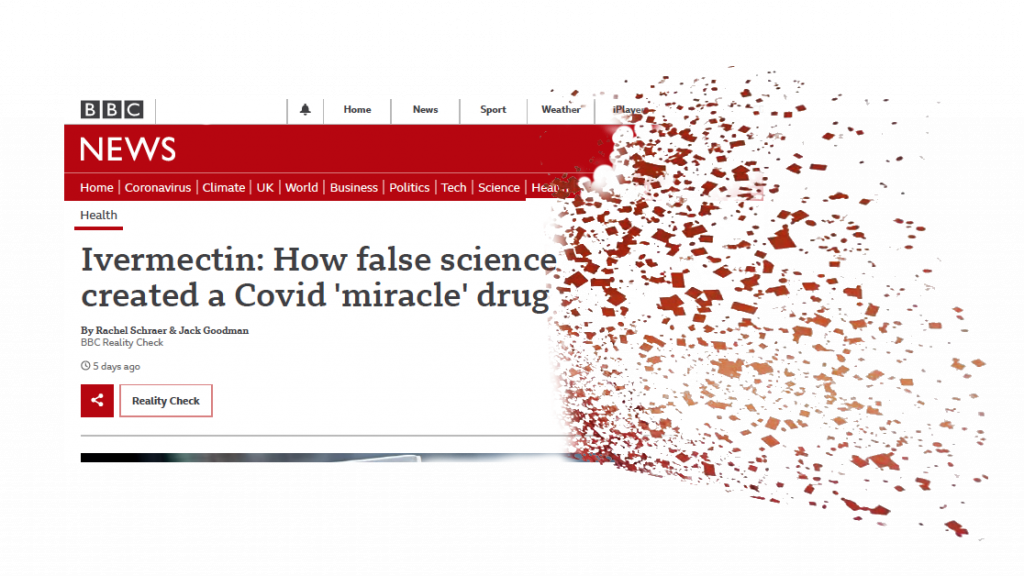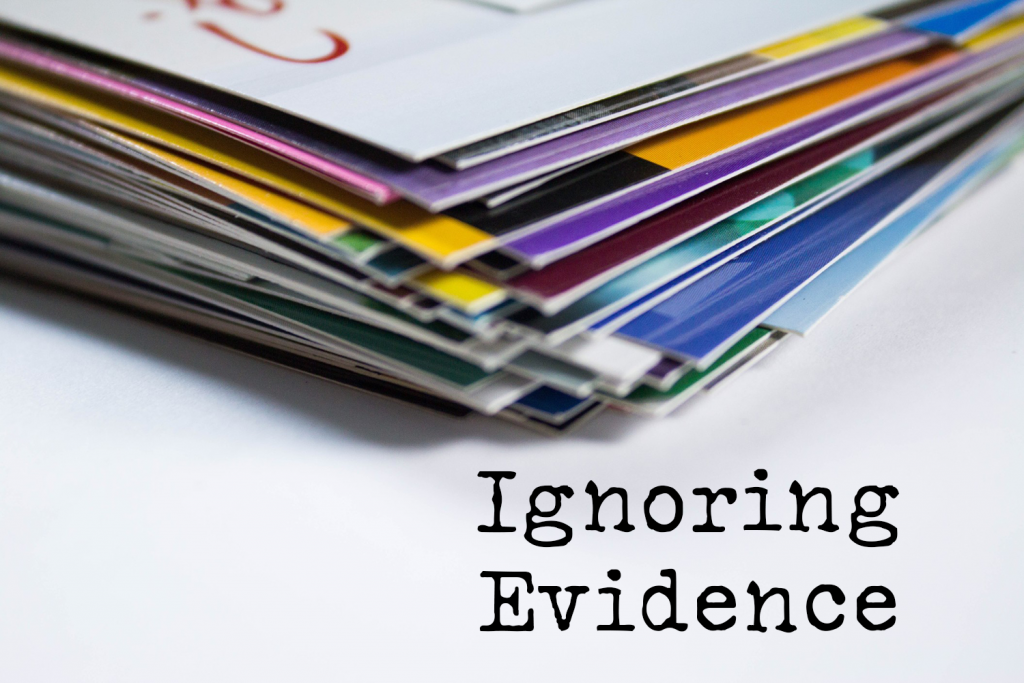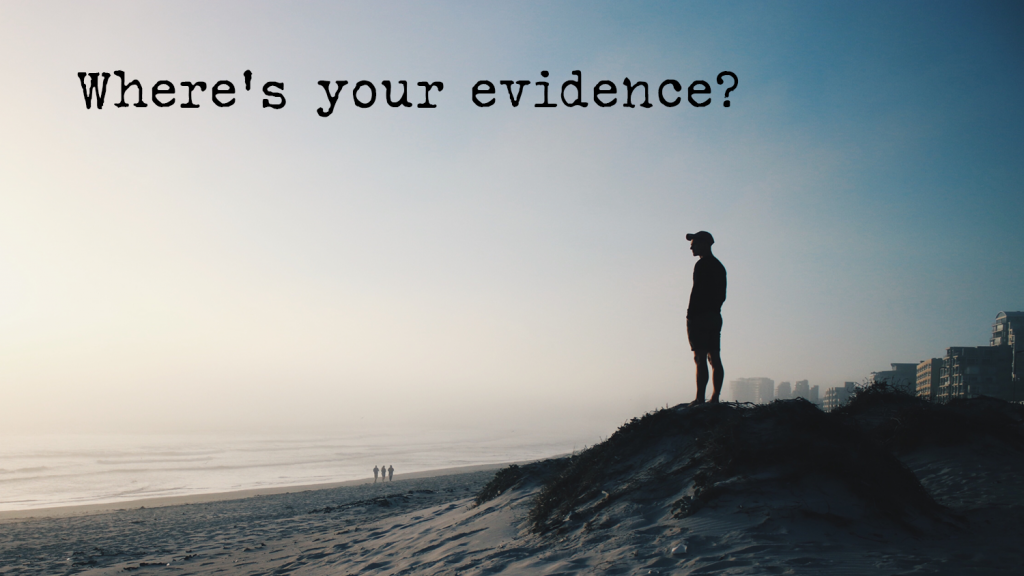Reflections on ivermectin, politics and science
Note that views expressed in Blog articles are the writers’ personal views and not necessarily those of BiRD

Prior to publication, the journalists were given detailed answers to their questions asked of Dr. Lawrie, yet they chose to completely ignore every single word and take as gospel these researchers’ as-yet-unavailable ‘findings’.
A number of people have expertly exposed the blatant bias and low grade reporting that is a discredit to the BBC. Check out Dr John Campbell’s excellent video and www.ivmmeta.com
This blog examines this BBC ‘reality check’, paragraph by paragraph and applies some reality to the assertions and expose the falsehoods they have apparently concealed.
It has primarily been championed by doctors who are using it to treat patients. Many of whom support the vaccines (not mentioned). Ivermectin and vaccines do different things.
It has been recommended in 39 countries, about 28% of the world’s population. Some states with vastly greater geographical and population challenges than our own island, are treating with great success.
Perhaps because many of these positive results for ivermectin are from LMIC (poorer) countries, their learnings aren’t perceived as valuable as those from Western countries. Keep up to date here: www.ivmmeta.com
This is not new commentary.
Most of the content is old and has already been successfully rebutted in journals without further challenge. Those rebuttals are public unlike the unspecified sources here. Which studies have the journalists used and verified by whom?
This is faint praise for such a wonderful medicine. It is completely true and there is more:
There is plenty of evidence.
But the authorities have chosen to deny its existence. Possibly for the same reason that the BBC and others appear to be campaigning to undermine it.
The BBC, with its wealth of journalistic experience, should know that governments have agendas and these journalists, Rachael Shraer and Jack Goodman, should be digging much deeper than the vacuous and barely researched positions displayed in this article.

For example; how is it that remdesivir – a standard of care for covid in the UK – was approved for use against covid on the basis of one (yes, one) study? Although it showed a marginal shortening of hospital stay, there was no difference in mortality and that the WHO does not recommend using it against covid.
On the other hand Ivermectin has 63 studies, of them 31 Randomised Controlled Trials (RCT), 7 meta-analyses, 32 Observational Controlled Trials(OCT), multiple country case studies, expert opinion, patient testimony ALL pointing in favour of the medication.
But the BBC ignores it all and just says there is ‘insufficient evidence’! The hypocrisy is unconscionable.
Governments and public health bodies are no saints when it comes to public health. Pharmaceutical companies have been known to supress data for commercial reasons, costing lives. The authors tend to forget, how the authorities suppressed research and colluded with the tobacco industry over 40 years to keep us puffing away (and earning tax) to the detriment of the global population.
Once more, Ivermectin is not ‘anti-vax’, it is supported by people of all walks of life both pro and anti vax, as well those unsure.
Obviously people should not take medicines formulated for animals.
Did the journalists ever stop to ask why?
Perhaps these are just ordinary people trying to exercise their individual agency and rights to healthcare in the best way they can?
Perhaps consider that these are also everyday members of the public, discontent with the silence of the MHRA and unable to access the correct version of the drug that is available to over 1/3 of the rest of the planet?
Perhaps these are the people who remember Vioxx, and how scientists from the pharmaceutical giant Merck skewed the results of clinical trials in favour of the arthritis drug to hide evidence that the drug increased patients’ risk of heart attack and have since spent billions of dollars settling claims of so many families who suffered and lost loved ones in their pursuit of profits.
Does the BBC condone the banning of early treatment for covid? If so they should have the courage of their convictions and state it openly.
‘Hype’, rather than ‘attention’ characterises it as a falsehood. ‘Belief’ rather than ‘knowledge’ characterises research as a faith not a science. Campaigners for the medication have robust evidence that it works and are intent on sharing the truth. So why does it appear that the BBC is trying to cover up the science behind ivermectin?
The BBC has unquestionably nailed its flag to suppression rather than consider objectivity. It has confirmed the campaigners’ point by not reporting or interviewing those producing properly researched evidence, preferring only the opinions of self-styled partisan investigators. The journalists of this article are unqualified to make scientific judgements and they failed to consult an independent expert. This looks like sub-standard journalism.
Independent?
Dr. Sheldrick: In July 2020, his company received through the MRFF and BMTH program a grant for just under 1 million dollars for new technology from a government that completely banned the use of ivermectin for covid, even to the extent of off-label use by doctors. Dr Sheldrick is a spine specialist.
Some journalists might consider this a conflict of interest whilst commenting on matters ivermectin, or at least mention it?
Gideon Meyerowitz-Katz, the main author in the group first referred to ivermectin as “something else to debunk” in December 2020, and later as a “horse dewormer”. He has taken a public position against early treatments for COVID-19 since at least July 2020, and even believed and propagated a made-up story that claimed ivermectin overdose was causing gunshot victims to wait at an Emergency Room.
But far more concerning, retired research specialist Capt. Dr Wong Ang Peng accuses Meyerowitz-Katz of fabricating evidence to discredit Prof Elgazzar. (https://louisaclary.wixsite.com/mysite-1/post/malaysia-doctor-review-of-elgazzar-withdrawn-ivermectin-study)
Why did the ‘fact checkers’ not report this as it directly concerns the reputation of those feeding information to the BBC?
Unsubstantiated. On what evidence is this based?
The only writings available are blogs by one ‘Gideon M-K; Health Nerd’ (presumably Mr Meyerowitz-Katz) critiquing various trials on ivermectin. Are these opinion pieces the evidence that this article is relying on?
As far as can be seen, no evidence has been published for the scientific community in order to test its assertions, as is the norm when challenging clinical papers. We are aware of a letter to Nature Medicine with overview of the same claims without reference to supporting evidence.
And to accuse a third of these scientists as potential fraudsters, without showing an iota of evidence (these are good men and women working hard to save lives and to help others for no financial gain) is nothing short of slanderous and the BBC owes these healthcare workers an apology.
This displays pure scientific ignorance and is unworthy of a BBC article. As the journalists are unqualified to verify the research they have been supplied, they should get an independent expert to do so.
Even if the trials mentioned on the blogs are excluded, ivermectin still shows a positive effect on covid. (Though these trials shouldn’t be excluded at this stage until there is proof.)
Ivermectin has the evidence to show it works
| Studies | Prophylaxis | Early treatment | Late treatment | Patients | Authors |
|---|---|---|---|---|---|
| 47 | 84% [69 – 91%] | 73% [63 – 80%] | 46% [23 – 62%] | 37,558 | 518 |
In fact, 83%, or 52 of 63 studies must be excluded to avoid finding statistically significant efficacy.
And, as far as country case studies are concerned, here is proof from Uttar Pradesh, region that is home to 240 million people.
Regarding the ‘exposé’ of Elgazzar et al; Jack Lawrence has admitted hacking into his data.
According to a recent article, in an email to Research Square, Prof. Elgazzar accused Lawrence of “taking strange raw material that had been fabricated and added to another website and linked to my research, but after reviewing it I confirmed beyond any doubt that it does not belong to me at all.”
Additionally, Prof. Elgazzar agrees with the assertions made by a researcher in an recently published review pointing out fabricated evidence to discredit the study,
“The Table 4 regarding mortality outcome is fake. Gideon [Meyerowitz-Katz] added the last two columns. The original paper of Elgazzar et al is without the last two columns.”
His paper was withdrawn by Research Square based on a singular complaint from Lawrence, a student, without giving Professor Elgazzar the opportunity to reply.
It appears highly unusual that The Guardian article appeared immediately after the publication was pulled and without the journalistic integrity of giving Prof Elgazzar’s side of the story.
As it stands his paper is still published in Research Gate
Whether the Elgazzar paper is discredited or not remains to be decided, the issue is that the judgement has been delivered by the media without due process and in an unethical and highly partisan manner.
Again, no evidence of this examination of ‘virtually’ every trial is offered (66 studies? 31 RCTs?). There isn’t a study or examination of all the trials made by this ad hoc group. If it is published, why isn’t there a link to it?
This sounds like an opinion is being offered as evidence without any data.
And, as told to other journalists, they did not look at all the studies.
And how do they explain that if they have investigated all of the studies why they haven’t flagged any of the very obviously problematic ones? (Eg; Lopez-Medina et al; a trial so dodgy >100 physicians wrote to the JAMA asking for it’s retraction (www.jamlatter.com). TOGETHER et al; protocol violations, patient mismatch etc. They remove mortality and adverse event outcomes, and sublingual administration mid-trial. Vallejos et al; A trial doing too little too late. Underpowered. They assigned people with a history of taking ivermectin into the placebo arm. No author declaration of conflict of interests. Dosage conditions not stated. The companion prophylaxis trial [Vallejos], which reported more positive results, has not yet been formally published, suggesting a negative publication bias. Etc.)
This displays an extreme selection bias that the BBC authors have failed to notice. Why?
Evidence? No evidence offered for any the above claims. If the reporters were shown evidence why did they not consult an independent expert to interpret it? It is a serious accusation to claim 5 studies have been faked. The article reports that 26 studies were examined, however there are 66 studies, the authors have not reported their results for all 26 either, and have not even provided a list of the 26 studies nor link to them.

All bad science should be flagged and exposed. And whilst there might be some issues with some studies – there always will be with a very large data base – questioning them needs to done with robust proof, not opinion. Mistakes happen, and underfunded studies, especially in LMIC countries, can have sloppy administration; data/dates get incorrectly typed and filed. Data collection errors occur. This is messy but does not constitute fraud nor faking.
Referring to one of the ‘scientists’ quoted in this article, the website ivmmeta claims that “An influential anti-treatment Twitter personality, journalist, and student epidemiologist has made a number of incorrect, misleading, hyperbolic, and unsupported statements. Author has been paid for writing anti-treatment articles, first referred to ivermectin as “something else to debunk”, and later referred to it as a “horse dewormer”.”
There are listed 22 other issues with his analysis and examples of his bias which prompts the question of his credibility in commenting on ivermectin and especially why the BBC journalists did not research this. (www.ivmmeta.com/#bbc)
(Note: To date, not one author of any of the disputed or criticised studies by this group has retracted their papers. In fact they have all defended them vigorously. All the trials criticised are still published, including Elgazzar. Why was this not mentioned?)
Since when is non-supply of data a conviction of scientific ‘fraud’?
It could be understandable that any self-respecting author of a report would be highly dubious about supplying information to this group given their track record of bias and accusation of falsification of evidence.
Pure speculation. Again, absolutely no evidence offered. Where is the actual data that shows this correlation? If the BBC has seen it why hasn’t it asked an independent expert to comment as the reporters who aren’t scientists are clearly unqualified to do so?
Pure opinion. How Dr. Sheldrick reach this conclusion?
What study is this one? If one is going to criticise a clinical study then the usual method is to name the lead author. If this is Samaha et al, it is not in the Bryant nor Hill meta-analyses. What retraction? It is still published. (https://pubmed.ncbi.nlm.nih.gov/34073401/)
See Cochrane rebuttal (https://osf.io/mp4f2/)
The Cochrane paper excluded so many studies it rendered itself powerless. It used 4 out of 24 available studies. Bryant et al meta-analysis, ranked # 9 out of 18 million publications, found 24 eligible studies despite rigorous evidence grading.
Why wasn’t this meta-analysis mentioned? It is one of the 10 most widely read clinical papers in history.
The Together Trial, in fact, confirms what ivermectin proponents have been saying all along: If you give a medication to a young cohort too late and in insufficient time intervals it will show little benefit.
True of most medicines and patently obvious. It is like your doctor telling you, on confirming an infection, to wait a week before taking any antibiotics and then prescribing you a lower than recommended dosage frequency. They won’t work very well.
The trial randomization chart does not match the protocol. There are major problems with the dosage frequency. The total number of patients for the ivermectin and placebo groups do not appear to match the totals in the presentation. Treatment was administered on an empty stomach, greatly reducing expected tissue concentration and making the effective dose about 1/5th of current clinical practice. The trial was conducted in Minas Gerais, Brazil which had substantial community use of ivermectin, and prior use of ivermectin is not listed in the exclusion criteria and could have skewed the placebo results.
The previous studies that demonstrate the efficacy of ivermectin follow similar protocols and were summarily ignored by Together.
Additionally, the Together authors admit themselves that the trial was too underpowered to provide a conclusion. Many experts agree that this trial was set up to fail and its authors were warned by colleagues of this.
And, even though a parallel trial of Fluvoxamine was conducted at the same time and results released, the results for the ivermectin trial have not yet been published. Why?
Why didn’t the ‘fact checkers’ pick any of this up? Is it to do with the fact that this flawed trail found no benefit for ivermectin?
This story has been thoroughly debunked already. The calls were not for “poisonings” but for dosage advice. And no one has died. This rechurning of a lie illustrates desperation. Ivermectin is safer than aspirin, safer than paracetamol. Why did the journalists not look at the Adverse Drug Reactions for other drugs for a balanced comparison?
(https://trialsitenews.com/u-s-poison-control-ivermectin-data-analyzed-by-trialsite-some-surprises/)
This is an anecdote. Not a study. We thought that this investigation was all about bonafide research from the independent experts here.
And for the record, Peru had an astounding success with ivermectin until a new political order changed that when they stopped its use. Now reintroduced, it is having an enormous impact once again. (https://trialsitenews.com/real-world-evidence-the-case-of-peru/)
And, what is the point of this sentence? Whatsapp is also encrypted and home to many ‘fringe’ groups. This ‘gateway’ concept is a massive problem for all social media platforms especially Facebook, Twitter etc. But you seem to only be concerned about Telegram.
Nobody should be harassed whatever their beliefs. Period.
But where on earth is the proof they have coordinated attacks? To equate ivermectin supporters to harassers of doctors is disingenuous and exposes the very malicious intentions of the authors, once again.
However no mention is made of those promoting the evidence for ivermectin being harassed by Authorities, Big Tech and Big Media, with bannings, demonetisations, etc, including the ad hominem attacks by the BBC.
Dr Andrew Hill is not a professor. Fact check. (It is curious how anyone who says anything negative about ivermectin suddenly gets awarded another degree or is promoted in status by the BBC team, and those who are pro get stripped of one!)
Again, abuse is intolerable and there is no room for it in any debate.
From what we can gather the abuse Dr Hill received was on Twitter and it was mainly strong comments on his sudden U-turn after previously publically endorsing ivermectin and his meta-analysis finding in its favour. (Dr Hill is accused of allowing the conclusion of his meta-analysis to be written by the sponsors of his trial.)
(https://trialsitenews.com/news-roundup-scientific-misconduct-accusation-with-dr-andrew-hills-ivermectin-meta-analysis/)
What on earth has this got to do with an article on ‘problematic studies? ‘ This seems to be a deliberate and clumsy attempt to denigrate credibility by weaving in an anti-vax association.
For the record BiRD is not anti-vax. It is pro-choice.
What poor research into Dr Tess Lawrie’s credentials led the authors to falsely describe her medical speciality (and omitting her PhD) ‘in pregnancy and childbirth’ (that would make her an obstetrician or a gynaecologist) and failing to mention her long-standing and, for the purposes of this report, far more pertinent world-class expertise of many years as a systematic reviewer and guideline methodologist for the World Health Organisation?
Perhaps the journalists are too keen to discredit expert and credible view points that don’t fit the anti ivermectin narrative
She is also the director of the independent Evidence-based Medicine Consultancy Limited, and the community interest company EbMCsquared CiC and the convenor of BiRD, a group of international doctors and scientist promoting ivermectin based on evidential science. She is rated in the top 5% of researchers on Researchgate, a database of medical researchers. A journalist doesn’t miss this, they choose to ignore it and distort it.
More importantly, Dr Lawrie is a brave doctor who has taken her Hippocratic oath seriously and is prepared to call it out as it is. She is concerned for human wellbeing and not appeasing her paymasters. Her call for a pause to the vaccination program is true and, in fact, follows MHRA’s specified use criteria for the Yellow Card system. She did not imply causality but called for the pause to establish causality or not. That is the purpose of the “early” warning Yellow Card set up. Why invent a safety system if one is going to ignore it? The authors of this article know this as Dr Lawrie answered this in questions to them. See the info provided to the BBC journalist and notice how much of it was reported. (https://trialsitenews.com/a-letter-to-the-bbc/)
Whilst indulging in ad hominem slander, as self-styled fact checkers, the BBC journalists should at least get the facts right, they might be more credible.
And of course, the true intentions of the journalists are made clear by their call back to anti-vax just to keep up the demonising quotient.
Not true. Peru re-introduced it. In India, the ICMR only recommends, the states decide on protocols and Ivermectin remains in place. Uttar Pradesh , Delhi, Goa, Uttarkhand have all but eliminated covid as a threat due to ivermectin. The roll out, part of a medikit, being aided by the WHO and the American CDC. News in from Indonesia reporting astounding success in their roll-out. Learn more here: and here

When a statement from a Big Pharma PR department is taken as evidence for a BBC-position everyone should be very, very concerned about impartiality.
Merck stated that there is “no scientific basis for a potential therapeutic effect against COVID-19 from pre-clinical studies”. This is contradicted by many papers and studies, including [Arévalo, Bello, Choudhury, de Melo, DiNicolantonio, DiNicolantonio (B), Errecalde, Eweas, Francés-Monerris, Heidary, Jans, Jeffreys, Kalfas, Kory, Lehrer, Li, Mody, Mountain Valley MD, Qureshi, Saha, Surnar, Udofia, Wehbe, Yesilbag, Zaidi, Zatloukal].
They state that there is “no meaningful evidence for clinical activity or clinical efficacy in patients with COVID-19 disease“. This is contradicted by numerous studies including [Afsar, Alam, Aref, Babalola, Behera, Behera (B), Bernigaud, Budhiraja, Bukhari, Chaccour, Chahla, Chahla (B), Chowdhury, Elalfy, Espitia-Hernandez, Faisal, Hashim, Huvemek, Khan, Lima-Morales, Loue, Mahmud, Mayer, Merino, Mohan, Mondal, Morgenstern, Mourya, Okumuş, Ravikirti, Seet].
They also claim that there is “a concerning lack of safety data in the majority of studies“. Safety analysis is found in [Descotes, Errecalde, Guzzo, Kory, Madrid], and safety data can be found in most studies, including [Abd-Elsalam, Afsar, Ahmed, Aref, Babalola, Behera (B), Bhattacharya, Biber, Bukhari, Camprubí, Carvallo (C), Chaccour, Chahla (B), Chowdhury, Elalfy, Espitia-Hernandez, Gorial, Hazan, Huvemek, Khan, Kishoria, Krolewiecki, Lima-Morales, Loue, López-Medina, Mahmud, Mohan, Morgenstern, Mourya, Okumuş, Pott-Junior, Seet, Shahbaznejad, Shouman, Spoorthi, Szente Fonseca, Vallejos (B)].
Merck didn’t show how they came to that conclusion – no research was presented.
“Coincidentally”, they also are introducing an oral anti viral treatment (Monulpiravir) at $700 that uses a medication (originally developed for horses) and research has shown the principal ingredient to be mutagenic. Read more in this article.
WHO’s science chief, Dr. Soumya Swaminathan, is being taken to court as result of using this same Merck PR statement to try to suppress the ivermectin roll out in India.
In the interests of balance, why did the journalists of this article not mention this as it is highly pertinent to the contradiction of this statement?
A grossly cynical manipulation of a rare and tragic story to instil fear in people rather than to inform. And as an anecdote the BBC should have balanced this with a testimonial from one of the millions who have taken ivermectin and recovered at a greater rate than those who didn’t take it.
But while on this subject, let’s also ask to 100 to 200 US congressmen, women their families and staff who have been treated with ivermectin.
Let’s also look at India and now Indonesia. Between them over 300 million people will now have a relatively covid free experience thanks to ivermectin. Why is this being ignored when we have proof of alleviation from the pandemic staring at us in the face?
It is very sad to see a once revered news source producing articles like this which represent an insult to all the good BBC journalists that uphold the integrity of their profession.
Share:
The team at Bird are transparent in our operations. Bird is a campaign managed through EbMCsquared, a not-for-profit Community Interest Company. It means 100% of profits after tax are reinvested into the business or to the advancement of our social purpose, for example to work on projects such as the Ivermectin campaign. We are here to promote and provide evidence for health and wellbeing, to inform decision-making on matters of public health and safety. We do this to advance health and wellbeing for the benefit of humankind.
Nothing on this Website provides medical advice or any form of diagnosis or treatment of any kind to web users. Medical decisions should be made by the patient’s physician who can consider a review of the BIRD materials and knowledge of the patient’s medical history and condition. All information provided on the BIRD website or in connection with the Website are offered to promote consideration by trained health care professionals of possible treatments and for general informational purposes and are not medical advice to users. Errors and Omissions excepted.
| Cookie | Duration | Description |
|---|---|---|
| cookielawinfo-checbox-analytics | 11 months | This cookie is set by GDPR Cookie Consent plugin. The cookie is used to store the user consent for the cookies in the category "Analytics". |
| cookielawinfo-checbox-functional | 11 months | The cookie is set by GDPR cookie consent to record the user consent for the cookies in the category "Functional". |
| cookielawinfo-checbox-others | 11 months | This cookie is set by GDPR Cookie Consent plugin. The cookie is used to store the user consent for the cookies in the category "Other. |
| cookielawinfo-checkbox-necessary | 11 months | This cookie is set by GDPR Cookie Consent plugin. The cookies is used to store the user consent for the cookies in the category "Necessary". |
| cookielawinfo-checkbox-performance | 11 months | This cookie is set by GDPR Cookie Consent plugin. The cookie is used to store the user consent for the cookies in the category "Performance". |
| viewed_cookie_policy | 11 months | The cookie is set by the GDPR Cookie Consent plugin and is used to store whether or not user has consented to the use of cookies. It does not store any personal data. |


Please support our campaign with a monthly or a single amount to help us keep pressure on authorities to approve the safe drug ivermectin that will help beat covid-19 and save lives around the world.
Bird Group/EBMC Squared is a not-for-profit Community Interest Company (CIC).
All funds received will be invested in our activities to promote public health and wellbeing.
Your monthly or single contribution will help us keep pressure on authorities to approve the safe drug ivermectin that will help beat covid-19 and save lives around the world.